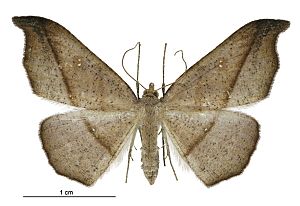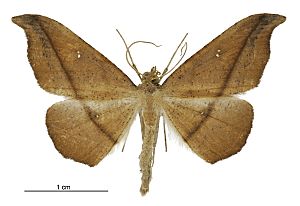Sarisa (moth) facts for kids
Quick facts for kids Sarisa (moth) |
|
|---|---|
 |
|
| Female | |
 |
|
| Male | |
| Scientific classification | |
| Kingdom: | |
| Phylum: | |
| Class: | |
| Order: | |
| Family: | |
| Genus: |
Sarisa
D. S. Fletcher, 1979
|
| Species: |
S. muriferata
|
| Binomial name | |
| Sarisa muriferata (Walker, 1863)
|
|
| Synonyms | |
|
|
Sarisa muriferata is a special kind of moth found only in New Zealand and its nearby islands. It is the only species in its group, which is called the Sarisa genus. This means it is a monotypic genus. A scientist named Francis Walker first described this moth in 1863.
Contents
About the Sarisa Moth
The Sarisa muriferata moth is part of the Geometridae family. These moths are sometimes called "loopers" or "inchworms" because of how their caterpillars move. This particular moth is endemic to New Zealand. This means it is found naturally nowhere else in the world.
Where It Lives
You can find Sarisa muriferata moths across many parts of New Zealand. They live on both the North and South Islands. They have also been seen on Stewart Island, Big South Cape Island, the Chatham Islands, and the Auckland Islands.
What Adult Moths Do
Adult Sarisa muriferata moths have working mouthparts. This means they can eat and drink. They are often attracted to nectar from flowers, which they drink for energy.
If these moths feel threatened, they have a clever trick. They suddenly drop to the ground and stay perfectly still. Their wings are held motionless, making them look like a dead leaf. This special ability to blend in is called crypsis. It helps them hide from predators.
Life Cycle and Reproduction
The Sarisa muriferata moth likely has two generations each year in the North and South Islands. This means they complete their life cycle twice in a year. Adult moths are usually seen flying from September to March.
In the colder, southern parts of their range, like the Auckland Islands, they probably only have one generation per year. In these areas, the adults fly during January and February.
What Larvae Eat
The young moths, called larvae or caterpillars, feed on certain plants. They have been seen eating Microsorum pustulatum, which is a type of fern. They also eat Dicksonia fibrosa, another kind of fern.
Scientists have also watched them feeding on the leaves and spore cases (sori) of Pyrrosia eleagnifolia. This is yet another type of fern.
Larva Appearance and Overwintering
When the larvae are fully grown, they are reddish-brown. They have a broken black line down their back. This line contains five oblong, yellowish-brown spots.
The species spends the winter as a pupa. This is a resting stage where the larva changes into an adult moth. It helps them survive the colder months.
 | Anna J. Cooper |
 | Mary McLeod Bethune |
 | Lillie Mae Bradford |

